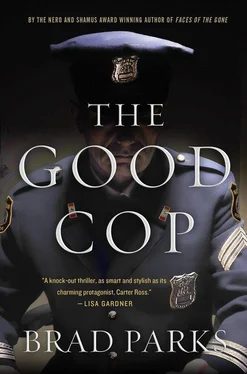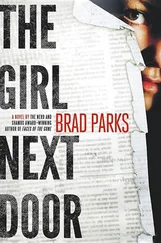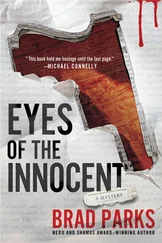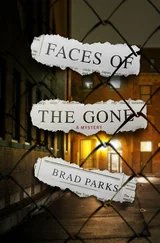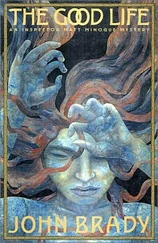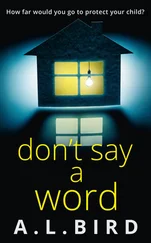Brad Parks - The Good Cop
Здесь есть возможность читать онлайн «Brad Parks - The Good Cop» весь текст электронной книги совершенно бесплатно (целиком полную версию без сокращений). В некоторых случаях можно слушать аудио, скачать через торрент в формате fb2 и присутствует краткое содержание. Год выпуска: 2013, ISBN: 2013, Издательство: Minotaur Books, Жанр: Триллер, на английском языке. Описание произведения, (предисловие) а так же отзывы посетителей доступны на портале библиотеки ЛибКат.
- Название:The Good Cop
- Автор:
- Издательство:Minotaur Books
- Жанр:
- Год:2013
- ISBN:9781250005526
- Рейтинг книги:3 / 5. Голосов: 1
-
Избранное:Добавить в избранное
- Отзывы:
-
Ваша оценка:
- 60
- 1
- 2
- 3
- 4
- 5
The Good Cop: краткое содержание, описание и аннотация
Предлагаем к чтению аннотацию, описание, краткое содержание или предисловие (зависит от того, что написал сам автор книги «The Good Cop»). Если вы не нашли необходимую информацию о книге — напишите в комментариях, мы постараемся отыскать её.
The Good Cop — читать онлайн бесплатно полную книгу (весь текст) целиком
Ниже представлен текст книги, разбитый по страницам. Система сохранения места последней прочитанной страницы, позволяет с удобством читать онлайн бесплатно книгу «The Good Cop», без необходимости каждый раз заново искать на чём Вы остановились. Поставьте закладку, и сможете в любой момент перейти на страницу, на которой закончили чтение.
Интервал:
Закладка:
But there was no rest for the wicked reporter. If the day was to end successfully-with me as the heroic journalist who had just delivered the big scoop-a number of things had to go my way. The first, and perhaps most important, was convincing the higher powers to let me use my (slightly ill-gotten) photos.
It is perhaps assumed, thanks to some of the less scrupulous practitioners out there, that newspapers simply run anything they can get their hands on. That is far from the case. Readers would be stunned if they knew the stuff we had that never made it into print-bombshells that we leave unexploded simply because we don’t think it’s responsible to detonate them. We’re especially cautious when it comes to unnamed sources. Anytime I use one, I need to have it okayed by multiple editors. And they’re cautious when it comes to giving that permission. Anyone who’d like to understand why can Google “Janet Cooke Washington Post.”
As such, I knew having these pictures and being able to base a story on them were two separate issues. Paul/Powell hadn’t been savvy enough-or sober enough-to tell me not to use his name. But I knew the kid would get fired faster than a bullet if I put his name in the paper. Hence, I needed clearance to use him unnamed.
I went straight upstairs to the newsroom, got the pictures off my cell phone, blew them up the best I could and made printouts. Satisfied they would do the job, I took them into Tina Thompson’s office. I tapped on the frame to her door but hadn’t yet settled my butt into one of the two chairs in front of her desk when I was greeted with: “Uh-oh, Mickey and Minnie got busy last night!”
I thought about telling her we had actually gotten busy this morning, too, but instead took the high road: “I do not feel it necessary to dignify these spurious accusations with a response.”
“You don’t need to. I saw Minnie driving out of the parking garage wearing yesterday’s clothes, singing, ‘It’s a small world after all.’”
“Funny, last night she was singing the Hallelujah Chorus, ” I said. “But I didn’t come to talk music with you. Check these out.”
I slid the photos at her. She spread them out, flinched when she saw the subject matter, then drew in for a closer look.
“What … what are these exactly?”
“Those are postmortem photos of Darius Kipps’s arms and legs, taken late last night in the Essex County Medical Examiner’s Office. I know the quality isn’t superior, but let me help you out: they’re rope burns. Someone tied Detective Kipps to a chair shortly before he made his exit from this world.”
“Tied him to a chair? Holy crap. Do the police know about this?”
“I don’t know how they couldn’t know. Presumably, they saw the same dead Darius Kipps that I did.”
“But if that’s the case, how could they say he-” Tina began, then it dawned on her. “Holy crap.”
“Yeah, that about sums things up.”
“And if Kipps didn’t kill himself, then-”
“Who did?” I completed her sentence. “I really don’t have a clue. I figured I’d get this story in the paper before I worried about the rest of it.”
“Do we … how did you … hang on, I’m calling Brodie,” she said, picking up her phone and tapping four numbers. She waited for what sounded like two rings, then said: “Hey, it’s Tina. Carter Ross has something you’re going to want to see,” she began, then told him about the photos. She finished with, “We’ll be right down.”
“I’ll save you having to repeat yourself in explaining how you got this stuff,” she said, and before I could slow her down, she was already out from behind her desk and on the way to see our executive editor.
Harold Brodie had inhabited the corner office in our newsroom so long there weren’t many people around, besides perhaps Buster Hays, who remembered otherwise. He was a legend in the state of New Jersey and in the newspaper industry generally, a much-beloved patriarch.
In some ways, it was hard to take Brodie too seriously. He was now somewhere beyond seventy and he had this pleasant, grandfatherly manner about him, like he was going to offer you the maraschino cherry from his manhattan any moment. His high-pitched voice had gone raspy, as tends to happen to men of that age, and his wispy gray eyebrows were long enough to need braiding. A small man to begin with, he was now entering into the advanced stages of geriatric shrivel, such that I expected him to disappear altogether one of these years.
Still, for all that, something about Brodie scared the crap out of me. Hays had told me stories about him as a young editor that made my toes curl. And I had enough of my own experiences with his non-mellow side to know that he had the capacity to turn himself into a windshield-and me into a bug-at any time.
In truth, I had hoped that I could tell Tina the real story and then let her figure out what to tell Brodie. It wasn’t so much we wanted to lie to the old man. It’s just sometimes things needed to be, well, sanitized. Wasn’t that what direct-line editors were supposed to do for you?
But there would be no time to disinfect anything now. He was going to get the whole, dirty, absinthe-swilling truth.
Brodie was playing classical music, as was often the case, but turned it down when we entered. Tina didn’t even bother sitting down before handing him the photos. As we settled into the chairs in front of him, Brodie took his time studying the pictures, shuffling back and forth between them.
“So,” he said, in his old man falsetto. “How did we come into possession of these?”
* * *
Brodie had directed the question at Tina, not even looking at me. Brodie is big into chain of command, to the point you’d think he had a military background. On most matters, he preferred talking to the editors who reported to him, not the lowly reporters. It wasn’t unusual for Brodie to discuss things with his editor as if the reporter wasn’t even in the room. I think that’s part of the reason Brodie scared me: I almost never talked to the man.
“I actually haven’t heard the story myself yet,” Tina said, turning to me.
Brodie followed her gaze. Showtime. I cleared my throat and said, “They were sent to me by an intern in the Essex County Medical Examiner’s Office.”
“Not for attribution, I assume?”
“Correct,” I said.
“And what is this person’s name?”
Another thing reporters owed to the legacy of Janet Cooke: editors insisted on knowing the identity of the unnamed source. They were then bound by the same ethics as reporters not to reveal it. Of course, I didn’t even know my source’s last name. I’m sure Kira did. But it was too late to ask her. So I just said, “Paul Powell.”
Whatever. We could sort it out later.
“And what do we think motivated Mr. Powell in sending this to us?” Brodie asked.
A lot of alcohol, I almost said. But that wasn’t the answer he was looking for. Brodie just wanted to know whether Paul/Powell had some kind of axe to grind, which was always something we had to take into account when using unnamed sources.
“Well, he’s a student, so I don’t think he has any ulterior motive,” I said. “He struck me as a kid who’s just trying to do the right thing.”
And besides, he had drunk enough absinthe to stone a horse.
“How do you know him?”
“Met him at a party last night. We got to talking. One thing led to another. He’s a little bit of an odd duck-if you met him and saw his tattoos, you’d understand-but all these kids have tattoos these days. There’s nothing he said or did that made me concerned about him. I think he was acting in good conscience.”
“I see,” Brodie said, his eyes again scanning the photos. “And how do we know for sure this is Darius Kipps?”
Читать дальшеИнтервал:
Закладка:
Похожие книги на «The Good Cop»
Представляем Вашему вниманию похожие книги на «The Good Cop» списком для выбора. Мы отобрали схожую по названию и смыслу литературу в надежде предоставить читателям больше вариантов отыскать новые, интересные, ещё непрочитанные произведения.
Обсуждение, отзывы о книге «The Good Cop» и просто собственные мнения читателей. Оставьте ваши комментарии, напишите, что Вы думаете о произведении, его смысле или главных героях. Укажите что конкретно понравилось, а что нет, и почему Вы так считаете.
